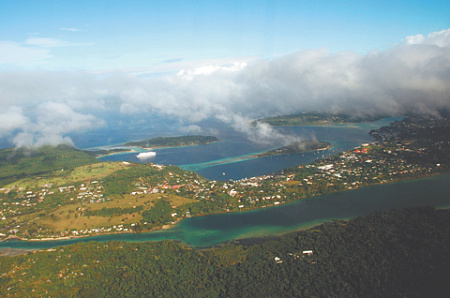
Vanuatu’s elected Prime Minister, Jotam Napath, has announced that he intends to renegotiate the security treaty with Australia. And this is despite the fact that the document was signed very recently – in 2022 and went through the ratification process. Small island states in the Pacific Ocean are trying to use the confrontation between China and the United States to reach agreements that are beneficial to themselves. In addition, the documents are increasingly including points on support in the fight against climate change, and with the submission of island states, rather than Western countries.
In an interview with British media, Napath, who was elected to the post of head of the country’s cabinet in February this year, said that the security treaty between Vanuatu and Australia does not include clauses on climate security.
“This is something we would like to return to, and something we would like to discuss openly with the Australian government,” he said.
On the one hand, Napata needs to demonstrate active activity in his post from the very beginning. The Australians, in general, do not mind. The only question is what specific commitments Canberra will make. But Napath said he had already discussed the details of updating the agreement with Australian Deputy Prime Minister Richard Marles.
Napath also expressed the hope that he would soon be able to negotiate a visa-free regime with Canberra.
It is very significant that Vanuatu is the initiative party, and Australia is ready to accept the demands of the island nation as reasonable and compromise.
The situation in the Pacific Ocean is characterized by the fact that the island states that China and the United States need as strongholds are putting forward their own conditions. They are aware of their geographical value and understand their importance in the modern geopolitical landscape.
In recent years, a number of security treaties have been signed between major Powers and island States. Among the most famous are the treaty between the United States and Papua New Guinea and the agreement between the Solomon Islands and China. And the small state of Tuvalu (the population of its islands and atolls does not exceed 11.7 thousand people) has concluded an agreement with Australia. At the same time, a separate clause in the agreement states that Tuvalu cannot conclude security agreements without the consent of Canberra.
In this sense, the story of the Cook Islands is quite revealing. The Prime Minister of this state, Mark Brown, signed a strategic partnership agreement in February during a five-day visit to China, envisaging the expansion of relations between Avarua and Beijing. However, Wellington, the capital of New Zealand, was outraged by this, since the former colony and the islands have a “free association” agreement. Avarua undertakes, in exchange for military and material assistance, to inform New Zealand of its intentions to conclude agreements with other States.
There were no consultations here. Brown justified his actions by saying that the agreement with China only complements the close relationship with New Zealand, not cancels it. However, it is also interesting that neither Wellington nor London demanded the termination of the agreement with China. Perhaps this is due to the fact that Brown did not conclude a military agreement. Or perhaps the era itself has changed and major powers are already becoming embarrassed to openly oppress the independence of small states. It is no coincidence that Caribbean countries are increasingly demanding reparations for the damage caused during the slave-owning era.
The foreign policy orientation of the island states has become one of the main topics of the local election campaigns. Separately, at the global level, these states advocate the idea of assistance in the fight against global warming. The fact is that warming is really dangerous for these countries: the islands are simply flooded from all sides.
At one time, India’s Prime Minister Narendra Modi was more active in calling for their help. However, the irony is that the world’s most populous country accounts for a significant contribution to environmental pollution. This is partly because Indians are still actively using coal as fuel.
